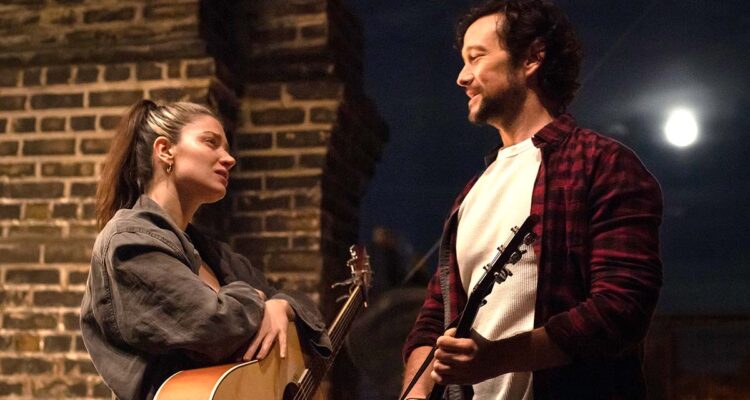John Carney makes musicals. He’s one of the few filmmakers today who makes them exclusively or even extensively; he’s the only one of that group whose musicals are, consistently, any good. (Sorry, Rob Marshall stans.) He doesn’t make old-school, characters-burst-into-song musicals because even he’s not that much of a masochist; instead, he tells stories set in the world of music about singers and songwriters and musicians and bands so that the songs can grow organically from the events on screen without temporarily shutting down the reality of a dramatic narrative. But even within these stricter confines, his musicals preserve the critical idea of musical theater: songs are the most direct communication of emotion – you can sing things you can never say because they’re too personal, too vulnerable, too much. His latest, “Flora and Son,” is a tiny lil’ wisp of a movie with nothing particularly new to say or an especially fresh way to say it. But damned if it doesn’t sock you right in the ticker anyway.
READ MORE: 25 Most Anticipated Movies At The 2023 Sundance Film Festival
The title characters are Flora (played, with scrappy vitality, by Eve Hewson) and her 13-year-old son Max (the moody but sympathetic Orén Kinlan). They don’t get along so well – one of their first scenes together climaxes with her calling him “an ungrateful feckin’ prick” — and Flora had Max so young that she never really had a young adulthood to enjoy, though she seems to hit the clubs in an attempt at a belated one with a fair amount of frequency. Those nights don’t help much; neither do the awkward drop-offs with her estranged husband Ian (Jack Reynor), Max’s dad. “This can’t be my story,” Flora despairs. “Livin’ in a shoebox with a kid who hates me.”
On top of all that, Max is turning into something of a juvenile delinquent, stealing and fighting, and generally causing trouble. “Flora, find him somethin’ to do,” pleads his counselor. “Somethin’ to keep those light fingers busy.” She thinks she stumbles on a solution when she finds an old guitar that someone’s throwing out, and it only costs a few bobs to clean up. But Max is absolutely uninterested, so Flora decides that she’ll maybe play it instead.
Carney is a romantic about love but especially about music, so his indictments of contemporary music culture — and how it is viewed chiefly through the paradigms of competition shows and social media – are quiet ones. And besides, it’s by surfing YouTube videos for guitar tips that Flora finds Jack (Joseph Gordon-Levitt), a would-be L.A. singer/songwriter who gives virtual guitar lessons for extra cash. He presses her for her motivations for learning to play, and they’re all exterior: she wants to impress people, look sexy, “write a female empowerment ballad and get me husband back.” But the more they talk, the more comfortable they get, and there’s a sweet and somewhat sexy quality to their increasingly intimate Zoom sessions. (Early on, Carney rearranges his frame, so we see Jack as she does, facing her at the kitchen table instead of on her laptop screen, and thank goodness; it’s a much more enjoyable way to both act and watch a two-person dialogue scene.)
Meanwhile, unbeknownst to Flora, Max has been making music of his own, using synths and loops and the like, and to Carney’s credit, he doesn’t sneer at the music Max is making as lesser or somehow impure. Quite the contrary, in fact: “Jaysus,” Flora exclaims, “it sounds so professional!”
You can probably guess, with pinpoint accuracy, what happens after that. Do Flora and Max mend their fences over their shared love of music? Do Flora and Jack fall into something like love, even over their screens? Can music save the world, or at least save this little corner of it? Is the Pope Catholic? If there’s a criticism to lob at Carney’s screenplay, it’s that the complications and difficulties feel a tad contrived; drama is created by friction, but it’s hard to create conflict that doesn’t feel phony in a script that doesn’t have any actual antagonists.
But this is niggling, frankly. Hewson, familiar from Soderbergh’s “The Knick” (and, fine, Bono’s family photos), is genuinely charismatic, which helps smooth over the character’s rough edges (that and the Irish accent, the Irish accent helps). Gordon-Levitt hasn’t turned out to be the most versatile of actors, but he’s got a particular thing he does well, and he’s doing it here. And Carney has been immersed in the world of music for long enough to fill the frame with little authentic touches: the terrible music video Ian’s band did back in the day (skipped and broken dreams are a constant through Carney’s work), a scene where Flora casually puts on Joni Mitchell’s “Both Sides Now” and discovers how a great song can take over a room and refuse to be background noise; the omnipresence of busty ukulele players at singer/songwriter nights.
It’s all very charming, and when these disparate souls start making music together – Flora offers up suggestions for one of Jack’s songs and helps Max make a video for the song he wrote for his crush – we get that very specific kind of goosebump that Carney can so expertly conjure up, the magic moment when these lost people finally find peace and/or love and/or truth, if only for the three-minute increments of a pop song. “It’s very intimate, innit? Singin’ together like that?” Flora asks Jack, and it is. If we’re being honest, Carney isn’t breaking new ground here, and I keep waiting for him to make a movie that will finally fully exhaust his Whole Thing. But “Flora and Son” is not that movie. [B]
Follow along with all our coverage of the 2023 Sundance Film Festival.

